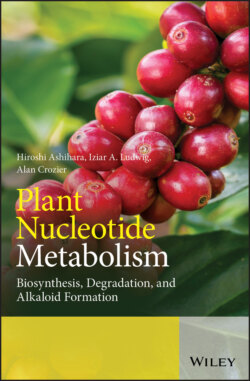Читать книгу Plant Nucleotide Metabolism - Hiroshi Ashihara - Страница 30
2.3 Concentration of Cytokinins
ОглавлениеCytokinins are a class of phytohormones (aka growth substances) that promote cell division in plants. They are involved primarily in cell growth and differentiation, but also affect apical dominance, axillary bud growth, and leaf senescence. Cytokinins, such as isopentenyladenine (8), trans-zeatin (9), and benzyladenine (10) are adenine-derived plant hormones. The major sites of cytokinin biosynthesis are roots, cambium, and other actively dividing tissues. Cytokinins play vital roles in the regulation of multiple physiological processes in plants including cell proliferation and differentiation, nutrient allocation, leaf senescence, and responses to external biotic and abiotic signals (Bishop et al. 2015; Crozier et al. 2000).
Compared to purine nucleotides, the concentration of cytokinins is extremely low. Cytokinins are now routinely analysed using ultra-performance HPLC–high resolution mass spectrometry. The concentration of isopentenyladenine cytokinins, isopentenyladenine (8), isopentenyladenine ribotide (11), and isopentenyladenine riboside (12) in A. thaliana seedlings has been reported to be 0.4, 2.4, and 5.7 pmol g−1 f.w., respectively. While those of trans-zeatin cytokinins, trans-zeatin (9), trans-zeatin riboside (13) and trans-zeatin ribotide (14) were 0.6, 2.8, and 1.6 pmol g−1 f.w., respectively. Levels of dihydrozeatin (15) and benzyladenine cytokinins were <20 fmol g−1 f.w. (Novák et al. 2008).
